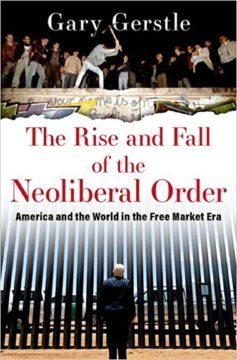L. Benjamin Rolsky in the Los Angeles Review of Books:
 INTELLECTUAL HISTORIES OF recent American public life typically foreground disintegration in order to capture the mood of a country on the brink. These moments are not only about the United States’s ongoing culture wars or its “hyper-politics” but also evidence of how the nation explains social and political change to itself with a turn of phrase or analytical framework.
INTELLECTUAL HISTORIES OF recent American public life typically foreground disintegration in order to capture the mood of a country on the brink. These moments are not only about the United States’s ongoing culture wars or its “hyper-politics” but also evidence of how the nation explains social and political change to itself with a turn of phrase or analytical framework.
For historian Gary Gerstle, such moments of rupture and conceptual birth are fundamental to understanding what he calls “the neoliberal order” in The Rise and Fall of the Neoliberal Order: America and the World in the Free Market Era. He is less interested in partisan explanations and more concerned with developing an academic category for measuring political shifts over multiple election cycles, arguing that there have been two phases of the American polity: the New Deal order and the neoliberal order. Party affiliation dating back to the 1920s becomes relative once compared to more capacious neoliberal assumptions shared by the likes of Ronald Reagan and Bill Clinton in the name of economic freedom.
More here.
